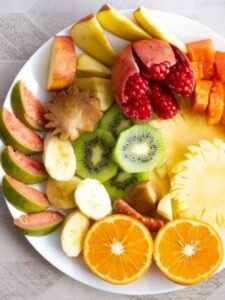Medically reviewed by Dr. Ramesh Gaddam, M.D. — Written by Sumalatha, D.N.H.E
Bananas are one of the most popular fruits worldwide, cherished for their convenience, natural sweetness, and numerous health benefits. Often regarded as a perfect on-the-go snack, bananas are also a common choice for breakfast.
Many people enjoy starting their day with a banana, thanks to its quick energy boost and nutritional value. However, despite their many benefits, there are considerations to keep in mind, particularly when consuming bananas on an empty stomach.
2. Banana Nutrition
Nutritional Profile of Bananas per 100g:
| Nutrient | Amount per 100g | % Daily Value (DV) * |
|---|---|---|
| Calories | 89 kcal | 4% |
| Carbohydrates | 22.8 g | 8% |
| – Sugars | 12.2 g | – |
| – Dietary Fiber | 2.6 g | 10% |
| Protein | 1.1 g | 2% |
| Fat | 0.3 g | <1% |
| Vitamin C | 8.7 mg | 15% |
| Vitamin B6 | 0.4 mg | 20% |
| Potassium | 358 mg | 10% |
| Magnesium | 27 mg | 7% |
| Folate | 20 µg | 5% |
| Riboflavin (B2) | 0.1 mg | 5% |
| Niacin (B3) | 0.7 mg | 4% |
| Iron | 0.3 mg | 2% |
*Percent Daily Values are based on a 2,000 calorie diet. Your daily values may be higher or lower depending on your calorie needs.
3. Digestive Impact of Eating Bananas on an Empty Stomach
While bananas offer numerous health benefits, consuming them on an empty stomach may not be suitable for everyone.

It is important to consider individual digestive sensitivities and overall dietary habits when incorporating bananas into the diet, especially as a breakfast option.
High Natural Sugar Content
Bananas are rich in natural sugars, including glucose, fructose, and sucrose.
When eaten on an empty stomach, these sugars are rapidly absorbed into the bloodstream, leading to a quick spike in blood sugar levels.
This sudden increase can cause an insulin response, which may be problematic for individuals with insulin sensitivity or diabetes.
The initial surge in energy might be followed by a rapid drop, potentially leading to feelings of hunger and fatigue shortly after consumption.
Potential for Gastrointestinal Discomfort
The acidic nature of the stomach when it is empty can interact with the carbohydrates and natural sugars in bananas, sometimes causing gastrointestinal discomfort.

This interaction can lead to bloating, gas, and in some cases, mild indigestion.
Bananas also contain a moderate amount of dietary fiber, which, while beneficial for digestion, might cause discomfort when consumed in isolation without other foods to balance the digestive process.
Risk of Increased Gas and Bloating
Bananas contain soluble fiber, particularly pectin, which can contribute to gas production in the digestive tract.
When eaten on an empty stomach, the body may process the fiber more rapidly, leading to an increased production of gas.
This can result in bloating and abdominal discomfort, especially for individuals who are sensitive to high-fiber foods.
Combining bananas with other foods that are easier to digest can help mitigate this effect.
4. Metabolic Effects
While bananas are a healthy and nutrient-dense fruit, their impact on energy levels and hunger should be considered, particularly when eaten alone on an empty stomach.
By pairing bananas with other nutrient-rich foods, it is possible to enjoy their benefits while minimizing potential drawbacks related to energy fluctuations and hunger control.

Influence on Energy Levels
Bananas are well-known for their ability to provide a quick energy boost due to their high carbohydrate content. When eaten on an empty stomach, the natural sugars in bananas (glucose, fructose, and sucrose) are rapidly absorbed, leading to an immediate increase in blood sugar levels.
This can result in a quick surge of energy, making bananas a popular choice for a pre-workout snack. However, this rapid rise in energy levels is often followed by a sharp decline, known as an energy crash, as insulin works to bring blood sugar levels back to normal.
This can lead to feelings of tiredness and increased hunger, which might affect overall energy and productivity throughout the day.
Implications for Weight Management
The rapid digestion and absorption of sugars from bananas can influence satiety and hunger control.

While the initial increase in blood sugar provides quick energy, the subsequent drop can trigger hunger pangs sooner than if a more balanced meal had been consumed.
This can lead to overeating or snacking on unhealthy foods later in the day. Additionally, the high carbohydrate content, while beneficial for immediate energy needs, may not provide the sustained satiety needed for effective weight management.
For individuals aiming to control their weight, combining bananas with protein or healthy fats can help maintain a more stable blood sugar level and prolong satiety.
5. Nutrient Absorption Concerns
Bananas contain a range of nutrients that are essential for health, but their consumption on an empty stomach can affect how well some of these nutrients are absorbed and utilized by the body.

Potassium Absorption
Bananas are rich in potassium, a mineral crucial for maintaining electrolyte balance, muscle function, and nerve signaling.
When consumed on an empty stomach, the body’s ability to absorb and utilize potassium might be less efficient due to the lack of accompanying nutrients that facilitate absorption.
Additionally, an excessive intake of potassium without other balancing nutrients could potentially lead to an electrolyte imbalance.
Balance of Electrolytes
The high potassium content in bananas can impact the balance of other electrolytes, such as sodium and magnesium.
Eating a banana on an empty stomach without other foods that contain these electrolytes might cause an imbalance, particularly in individuals with existing electrolyte issues.
Effect on Iron Absorption
Bananas, like many plant-based foods, contain compounds such as phytates and oxalates that can inhibit the absorption of certain minerals, including iron.
Presence of Inhibitors
Phytates present in bananas can bind to iron and reduce its bioavailability.
When bananas are consumed on an empty stomach, this inhibitory effect might be more pronounced, potentially impacting individuals who rely on dietary iron to prevent or manage conditions like anemia.
Risk for Individuals with Iron Deficiency
For those with iron deficiency or at risk of anemia, the timing and combination of foods are crucial.
Eating bananas alone on an empty stomach might not provide the best conditions for optimal iron absorption.
Pairing bananas with foods high in vitamin C, such as citrus fruits, can enhance iron absorption and mitigate the inhibitory effects of phytates.
Summary:
Considering these nutrient absorption concerns, it is advisable to consume bananas as part of a balanced meal rather than alone, especially for individuals with specific nutrient needs.
This approach ensures that the body can efficiently absorb and utilize the essential nutrients provided by bananas while maintaining a balanced intake of other important minerals and vitamins.
6. Specific Health Conditions and Risks
Understanding the specific health conditions and risks associated with eating bananas on an empty stomach is important for making personalized dietary decisions.

Individuals with diabetes, gastrointestinal issues, or banana allergies need to consider these factors to avoid adverse effects and maintain their overall health
Blood Sugar Management Challenges
Bananas have a high glycemic index, meaning they can cause a rapid increase in blood sugar levels.
For individuals with diabetes or insulin resistance, eating bananas on an empty stomach can pose challenges in managing blood sugar levels.
The quick absorption of natural sugars can lead to spikes that require careful monitoring and management.
To mitigate these effects, it’s advisable for diabetics to pair bananas with foods high in protein or healthy fats, which can slow down the absorption of sugars and provide more stable blood glucose levels.
Conditions Like Acid Reflux or Ulcers
The natural acidity of bananas can exacerbate symptoms in individuals with gastrointestinal conditions such as acid reflux or ulcers.
Eating a banana on an empty stomach might increase stomach acid production, leading to discomfort and aggravation of these conditions.
It’s often recommended for those with such gastrointestinal issues to eat bananas along with other non-acidic foods to help neutralize stomach acid and reduce irritation.
Allergic Reactions and Sensitivities
Although rare, some individuals may have allergies or sensitivities to bananas.
Symptoms of a banana allergy can include itching, swelling, and digestive discomfort.
For those with known sensitivities, consuming bananas, particularly on an empty stomach, may heighten the risk of an allergic reaction.
Such individuals should be cautious and consider alternative breakfast options that do not trigger their allergies.
7. Bananas vs. Other Fruits on an Empty Stomach
By comparing bananas with other fruits and understanding the benefits of combining them with other foods, it is possible to optimize their nutritional benefits while minimizing potential drawbacks.

These balanced breakfast combinations can help ensure a more stable and sustained energy release, better nutrient absorption, and improved overall digestive health.
High Sugar Content in Bananas
Bananas are often compared to other fruits like apples, berries, and citrus fruits.
Compared to these, bananas have a higher natural sugar content and a relatively higher glycemic index.
This makes them more likely to cause a rapid increase in blood sugar levels when consumed on an empty stomach.
In contrast, fruits like berries and apples have a lower glycemic index and provide a slower, more gradual release of sugar into the bloodstream.
Fiber Content and Digestive Impact
While bananas are high in soluble fiber, other fruits, such as apples and pears, also contain both soluble and insoluble fibers, which can aid in digestion and provide a more sustained feeling of fullness.
Citrus fruits like oranges and grapefruits, rich in vitamin C, can enhance iron absorption when consumed with other foods but may be too acidic for those with sensitive stomachs when eaten alone.
Benefits of Combining Bananas with Other Foods
Protein Sources
Pairing bananas with protein-rich foods, such as Greek yogurt, nuts, or eggs, can help balance blood sugar levels and prolong satiety.
Proteins slow down the digestion of carbohydrates, providing a more sustained energy release and reducing the likelihood of an energy crash.
Healthy Fats
Adding healthy fats to a meal with bananas, such as nut butters (e.g., almond or peanut butter) or avocados, can further stabilize blood sugar levels.
Fats take longer to digest, which helps in maintaining steady energy levels and improving nutrient absorption.
Complex Carbohydrates
Combining bananas with complex carbohydrates like whole grain toast or oatmeal can provide additional fiber and nutrients.
This combination ensures a more balanced meal that supports sustained energy release and better digestion.
Examples of Balanced Breakfast Combinations
Given below are some examples of balanced breakfast combinations with bananas.
Banana and Greek Yogurt Parfait
Layer slices of banana with Greek yogurt, a handful of granola, and some berries.
This combination provides a balance of protein, fiber, and healthy sugars for a well-rounded breakfast.
Banana and Nut Butter Toast
Spread almond or peanut butter on whole grain toast and top with banana slices.
This pairing offers a mix of healthy fats, protein, and complex carbohydrates, helping to keep blood sugar levels stable.
Banana Oatmeal
Cook oatmeal and top it with banana slices, a drizzle of honey, and a sprinkle of chia seeds.
This meal combines complex carbohydrates, fiber, and healthy fats, making it a filling and nutritious breakfast option.
8. Recommendations and Best Practices
Following are some recommendations and best practices for eating Bananas.

Eat Bananas in Moderation
Consuming bananas in moderation is key to enjoying their health benefits without experiencing adverse effects.
While bananas are nutritious, relying on them excessively, especially on an empty stomach, can lead to imbalances in blood sugar and nutrient absorption.
Timing Matters
The timing of banana consumption can significantly impact how it affects your body.
Instead of eating bananas first thing in the morning on an empty stomach, consider incorporating them into meals or snacks throughout the day.
This approach can help mitigate the rapid sugar absorption and potential digestive discomfort associated with eating bananas alone.
Ideal Breakfast Combinations
Following are some of the ideal break fast combinations of Banana.
Banana Smoothie:
Blend a banana with spinach, Greek yogurt, a handful of nuts, and a splash of almond milk. This smoothie provides a balanced mix of protein, fiber, and healthy fats.
Banana and Cottage Cheese:
Combine sliced banana with cottage cheese and a sprinkle of cinnamon. This pairing offers a good balance of protein and carbohydrates.
Banana and Chia Seed Pudding:
Prepare chia seed pudding with coconut milk and top with banana slices. This dish provides a mix of fiber, healthy fats, and protein.
Adding Other Nutrients
Adding sources of protein, healthy fats, and complex carbohydrates to banana-based meals helps to stabilize blood sugar levels and improve satiety. These combinations can prevent the quick energy crash associated with consuming bananas alone.
Individual Health Conditions
People with specific health conditions such as diabetes, gastrointestinal issues, or allergies should tailor their banana consumption accordingly.
For example, diabetics should pair bananas with protein or fats to moderate blood sugar spikes, while those with sensitive stomachs might benefit from eating bananas with less acidic foods.
Weight Management:
For those focused on weight management, incorporating bananas into balanced meals can help control hunger and prevent overeating.
Athletic Performance:
Athletes can benefit from the quick energy boost provided by bananas, especially when consumed before a workout. Pairing them with protein sources can also aid in muscle recovery.
Conclusion
Understanding the potential side effects of eating bananas on an empty stomach helps in making informed dietary choices.
While bananas offer numerous health benefits due to their rich nutrient profile, consuming them in isolation first thing in the morning might not be ideal for everyone.
By combining bananas with other nutritious foods and considering individual health needs, one can optimize their dietary benefits and enjoy a balanced, healthful diet.
Frequently Asked Questions
Users frequently searched for questions related to eating banana
Is it Okay to Eat Bananas on an Empty Stomach?
Eating bananas on an empty stomach can have both benefits and drawbacks.
While they are rich in essential nutrients like potassium, Vitamin C, and fiber, consuming them alone may cause a rapid increase in blood sugar levels and potential digestive discomfort.
It is generally better to pair bananas with other foods that provide protein or healthy fats to balance their effects on your body.
When Should You Not Eat a Banana?
You should avoid eating bananas:
- If you have diabetes or insulin sensitivity, especially on an empty stomach, due to their high sugar content.
- If you suffer from gastrointestinal issues like acid reflux or ulcers, as the acidity might aggravate these conditions.
- If you are allergic or sensitive to bananas.
Is Banana Not Good in the Morning?
Bananas can be a healthy part of a morning meal but eating them alone on an empty stomach might not be ideal due to their high sugar content and potential for causing an insulin spike.
It’s better to combine them with other foods such as yogurt, nuts, or whole grains to create a more balanced meal.
Is Banana Good to Eat When Hungry?
Bananas are a good option to satisfy hunger due to their high carbohydrate and fiber content, which can provide a quick energy boost.
However, to avoid a rapid energy drop, pair bananas with a source of protein or healthy fat.
What is the Best Time to Eat Banana Every Day?
The best time to eat a banana is as part of a balanced meal or snack.
Consuming them mid-morning or mid-afternoon with other foods can help maintain steady energy levels and prevent spikes in blood sugar.
Which Fruit is Good for Hungry?
Fruits like apples, pears, and berries are excellent choices for curbing hunger due to their high fiber content, which promotes satiety and provides a gradual release of energy.
What is Best to Eat When Hungry?
When hungry, opt for balanced snacks or meals that include:
- Protein (e.g., nuts, yogurt, cheese)
- Healthy fats (e.g., avocados, nuts, seeds)
- Fiber-rich carbohydrates (e.g., fruits, vegetables, whole grains)
What Not to Eat When Hungry?
Avoid consuming high-sugar or high-fat processed foods when hungry as they can cause rapid spikes and drops in blood sugar levels, leading to increased hunger and energy crashes.
Also, avoid spicy or acidic foods on an empty stomach as they may cause digestive discomfort.
Which Fruit is Best for an Empty Stomach?
Fruits that are low in acid and high in fiber, such as apples, pears, and berries, are good options for an empty stomach.
They provide gradual energy release and are less likely to cause digestive issues.
What Foods Should I Avoid on an Empty Stomach?
Avoid the following on an empty stomach:
- High-sugar foods (e.g., pastries, candies)
- Spicy foods (e.g., hot peppers, spicy sauces)
- Acidic foods (e.g., citrus fruits, tomatoes)
- Carbonated drinks (e.g., soda, sparkling water)
What Fruit Should I Eat Every Morning?
Berries (e.g., strawberries, blueberries), apples, and pears are excellent choices to eat every morning due to their high fiber, antioxidants, and low sugar content.
What is Good in Morning Empty Stomach?
Drinking water or warm lemon water is good for hydrating the body first thing in the morning.
Follow this with a balanced breakfast that includes a combination of protein, healthy fats, and fiber.
Can I Drink Milk on an Empty Stomach?
Drinking milk on an empty stomach can be problematic for some people, especially those who are lactose intolerant.
It is generally better to consume milk with other foods to aid digestion and prevent potential stomach upset.
What Are 10 Good Breakfast Foods?
- Oatmeal
- Greek yogurt
- Eggs
- Whole grain toast
- Berries
- Avocado
- Nuts and seeds
- Cottage cheese
- Smoothies with protein
- Chia seed pudding
Which Drink is Best for an Empty Stomach?
Warm lemon water or plain water is the best drink for an empty stomach. It helps in hydrating the body, kick-starts the digestive system, and can help flush out toxins.
By considering these guidelines, you can make informed choices about your diet and optimize your nutrition for better health and energy levels throughout the day.
Also Read:
Balsamic Vinegar: 12 Health Benefits for Skin, Weight Loss
CACAO: 11 Health Benefits for Skin, Hair, Men, Women & More
Medically reviewed by Dr. Ramesh Gaddam, M.D.

General Physician, Diabetologist, and Critical Care Specialist.
Discover more from Health Build-Up
Subscribe to get the latest posts sent to your email.

1 thought on “7 Side Effects of Eating Banana on an Empty Stomach (Best Tips)”
Comments are closed.